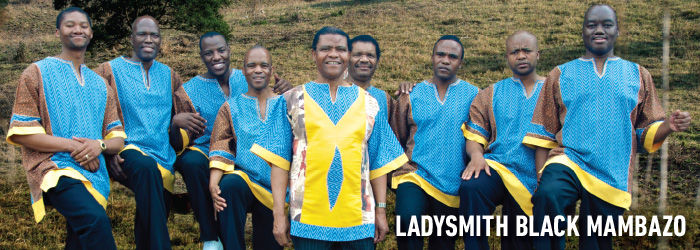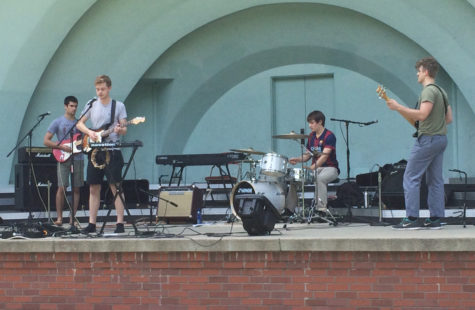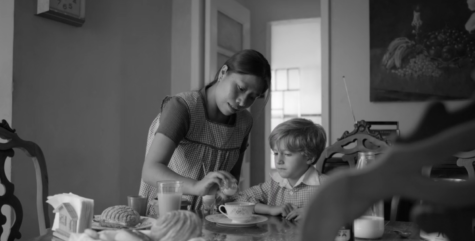Ladysmith Black Mambazo to bring culturally-infused music to Stephens
February 1, 2017
The Mbube choral group Ladysmith Black Mambazo will perform at Stephens Auditorium on Sunday. Hailing from South Africa, the group was formed in the 1960s by Joseph Shabalala and continues to be a driving force in folk music today.
The group has been nominated for numerous Grammy awards, four of which it has claimed. It is up for the Grammy for Best World Music Album this year. On top of that, many of its records have been certified platinum and gold.
Although the groups lineup has changed several times, the newcomers who are welcomed into the ensemble understand the importance of the message their songs relay.
With more than 50 albums under the group’s belt, shuffling through the group’s hulking discography uncovers themes of peace, hope and the kindness of the human spirit. The band welcomes all to join in celebrating life itself and South African culture.
Albert Mazibuko is a longtime member of the band, joining in the late 1960s and working today as an integral member and leader. Along with Joseph Shabalala, Albert performs today as one of the last original members of the band.
Mazibuko’s stories were captivating and insightful, offering a closer look into the group’s humble beginnings, and the struggles it faced on its way to the top.
The name of the band is a callback to the group’s hometown of Ladysmith. A mambazo, as Mazibuko describes it, is “a very important tool, a chopping axe of sorts, helpful for building homes and providing lives for people.”
“We like to think of our voices as the mambazos,” he said. “Our voices will build a house for the world.”
It seemed impossible for a choral group, such as Ladysmith Black Mambazo, to be a success under the circumstances of the strenuous lives the members led. Hard work and education were expected of young adults.
“No one was making it in music”, Mazibuko said. “We were fired from our jobs in 1973 because we tried to balance music and work. We were gone on Fridays and Mondays because of travel, so we were fired.”
The job loss was hard on Mazibuko and his family.
“My mother was so worried,” Mazibuko said. “She didn’t believe music would ever provide the money we needed. Life was so difficult at that time, we all lived in one rented room, it was easy to count us out. But I knew if we could do it right, it would become a living. I could see it in my dreams, it was right in front of us.”
Mazibuko’s family never supported his musical decisions early in his career, but, as Mazibuko recalls, two years later, that all changed.
“It started to pay off,” he remembered. “After the first initial album recordings, the check was very nice. I went home to my parents in a new car loaded up with food.
“Funny thing is, the car broke down pretty close to home, but anyway my parents started to say, ‘Wow, life will be good now,’ and it was.”’
The band’s music is inspired partly by the hardships of growing up during apartheid, and the culture of their native land.
“Everybody sings where I’m from,” Mazibuko said. “If something doesn’t go the way they’d like, they sing. To deal with hardships people sing, my mother, father, everyone would sing for empowerment.”
The group strives to capture those feelings and relate them to everyone.
“The songs that Joseph composed encourage people to find hope and move forward,” Mazibuko said. “Ladysmith Black Mambazo is about peace, love and harmony.”
I ended the interview by asking a question concerning the group’s relationship with critically-acclaimed musician Paul Simon and how they collaborated together in the 1980s.
“He was great,” Mazibuko recalled. “He put us on the world map like the Grammy nominations did, and not in the way we expected.
“When we first got the call, he was interested in performing with us. We met him in London with caution. The first day of recording was filled with uneasiness, but in the days that followed, he revealed that he wanted to fit in with us and our style, not the other way as we expected.”
One of the products of this collaboration was the acclaimed studio album “Graceland” by Paul Simon.
Attendants at Stephens Auditorium on Sunday will hear why Ladysmith Black Mambazo is still performing successfully after more than 50 years. Mazibuko hopes audience members will not only learn about culture through the group’s music, but maybe something about themselves as well.
The show will start at 2:30 p.m. Tickets start at $22 and can be purchased through the Stephens Auditorium website.















